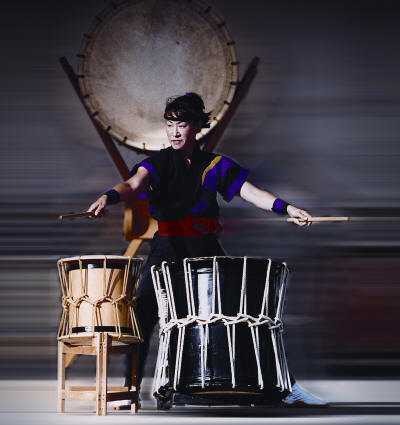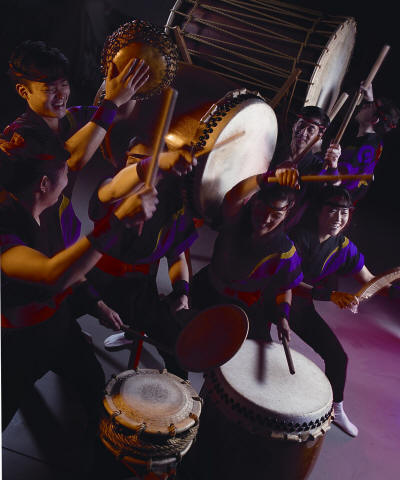University
Communications
Office
Arkansas State University
Jonesboro,
Arkansas
Staff
Markham Howe
Sara McNeil
Gina Bowman
(870) 972-3056
fax (870) 972-3693
More information:
NewsPage
Links to News Releases
& Announcements
Campus Calendar
Public activities at ASU
About
ASU
Overview, history
and more |
ASU's Fowler Center Series opens 2009-10 season
with San Jose Taiko Sept. 25
August 25, 2009 --
The
Fowler Center Series opens its 2009-10 season in Riceland Hall on
Friday, Sept. 25, at 7:30 p.m. with a performance by
San Jose Taiko. Fowler Center is
located at
201 Olympic Drive, Jonesboro.
San Jose Taiko has mesmerized
audiences and critics with the powerful, spellbinding, and propulsive
sounds of the taiko drums for three decades. Inspired by traditional Japanese
drumming, company performers express the beauty and harmony of the human
spirit through the voice of the taiko as they strive to create new
dimensions in movement and music. Japanese
drumming, company performers express the beauty and harmony of the human
spirit through the voice of the taiko as they strive to create new
dimensions in movement and music.
Founded in 1973 by young Asian Americans searching for an artistic and
musical outlet to convey their unique experiences as third-generation
Japanese Americans. San Jose Taiko looked to Japan for inspiration and
selected the symbolic taiko as their instrument of expression.
As a symbol, taiko holds much of the essence and spirit of Japan,
replete with continued possibilities, renewal, and transformation. Its
origins were found in the daily life of the common people. Priests used
taiko to dispel evil spirits and insects from the rice fields; samurai
used taiko to instill fear in the enemy and courage in themselves; and
the peasants used taiko in their prayers for rain, in festivals, and in
thanksgiving for bountiful harvests. The traditional practice and
performance of taiko requires dedication, physical endurance, harmony,
and a collective spirit.
San Jose Taiko has taken this essence and this voice of the traditional
taiko and infused it with the vitality and freshness of the American
spirit, creating a dynamic and co mpelling new Asian American art form.
The artists use the power and beauty of taiko to transcend cultural
barriers and foster a greater understanding of Japanese American
culture. Taiko is so deeply a part of the traditions of the Japanese and
the Shinto and Buddhist religions that it is considered to be both the
essence and the heartbeat of the Japanese spirit. mpelling new Asian American art form.
The artists use the power and beauty of taiko to transcend cultural
barriers and foster a greater understanding of Japanese American
culture. Taiko is so deeply a part of the traditions of the Japanese and
the Shinto and Buddhist religions that it is considered to be both the
essence and the heartbeat of the Japanese spirit.
Under the artistic direction of founder Roy Hirabayashi and musical
director P. J. Hirabayashi, performance and expression are predicated
upon a profound respect for each member of the company. Rehearsal and
performance require physical endurance, and both running and exercise
are required of company members during practice. Composing,
choreographing, designing and creating costumes, and handcrafting drums
are also part of the holistic process in which all members participate;
many of the performance compositions are written or arranged by company
members. Through a singleness of mind and spirit, harmony is achieved
and the music rings with unity and clarity.
By studying with masters of other traditions and cultures, San Jose
Taiko musicians have broadened and embellished this historical art form.
Their style joins the traditional rhythms of Japanese drumming with the
beat of world rhythms, including African, Balinese, Brazilian, Latin,
and jazz percussion. The sound is contemporary, exciting, new and
innovative, bridging many styles, while still resonant of the Asian soul
in America. Company members also study traditional and contemporary
dance with leading international choreographers. All of San Jose Taiko's
performances are fully choreographed, theatrically lit extravaganzas of
musical sound.
Recognized for its artistic and managerial excellence, San Jose Taiko
received both Advancement and Challenge Grants from the National
Endowment for the Arts, the Chevron Award for Excellence, and a grant
from the Knight Foundation. The California Arts Council and the Arts
Council Silicon Valley have honored the company with commendations for
community leadership in fostering cultural and ethnic diversity in the
arts.
Ticket prices are $30 and $20 for adults; $24 and $16 for ASU faculty
and staff; $23 and $15 for senior adults and K-12 students; and $10 and
$6 for ASU students.
Tickets for all Fowler Center Series events may be purchased by calling
(870) 972-2781 or 1-888-278-3267. Purchase tickets online at
www.yourfowlercenter.com.
On performance evenings, the box office in Fowler Center opens one hour
prior to the event.
Visit
Fowler Center on the Web
for additional information about the performance by San Jose Taiko, or
call Fowler Center at (870) 972-3471. Visit
San Jose Taiko for more information about the group, its members,
and its music, including an
audio gallery of sample audio clips.
#
# #
|
